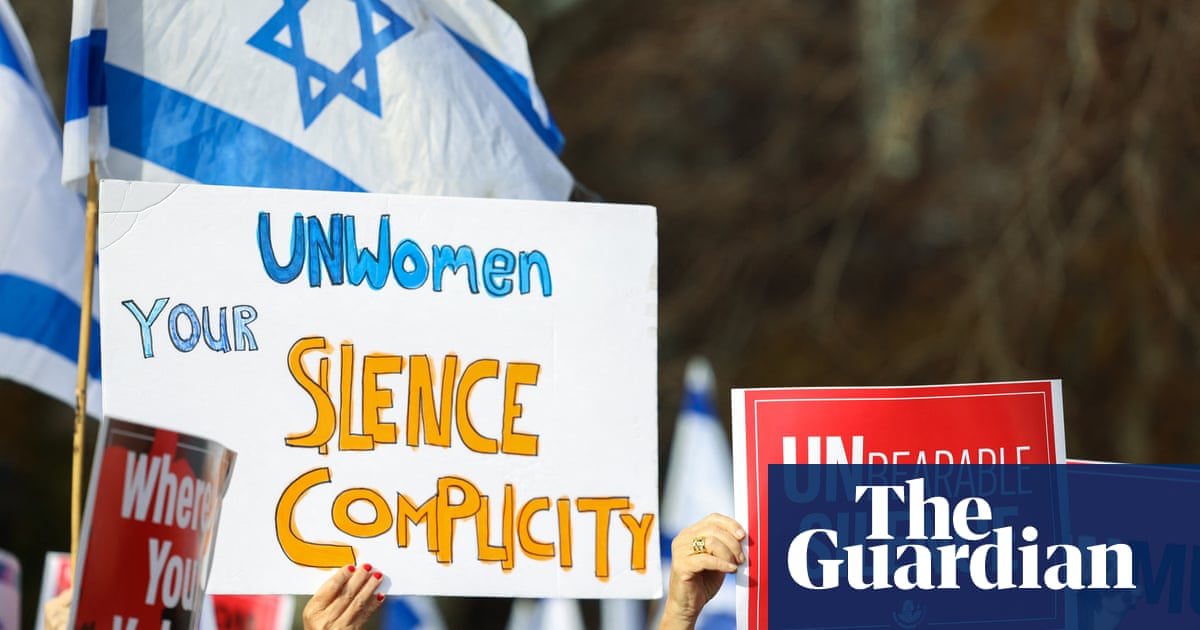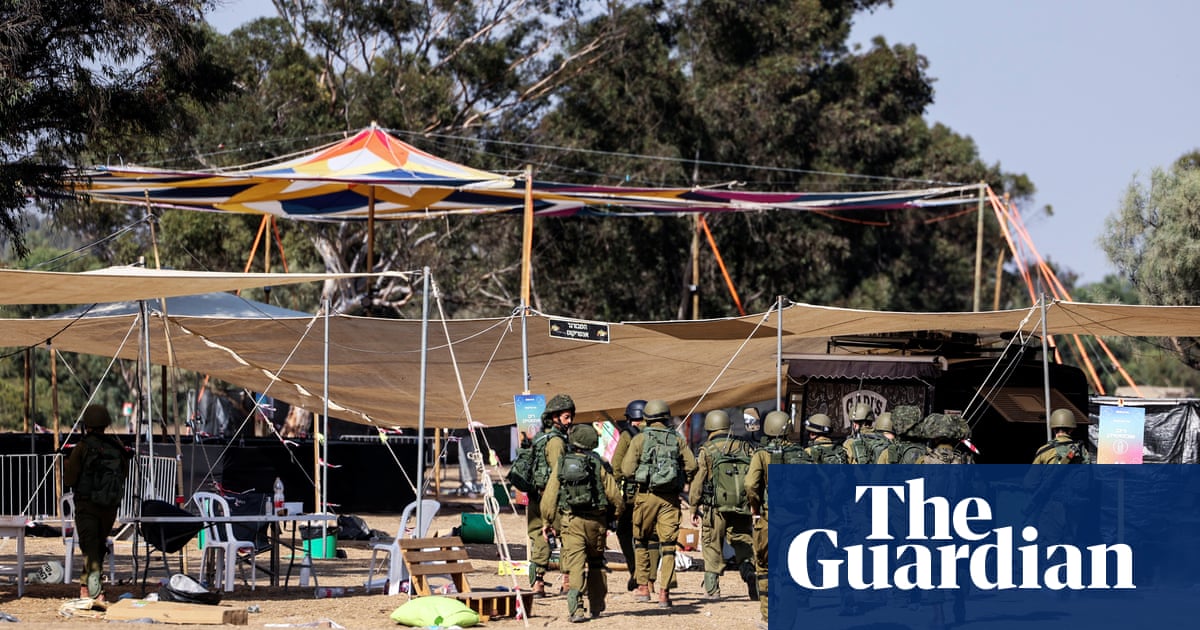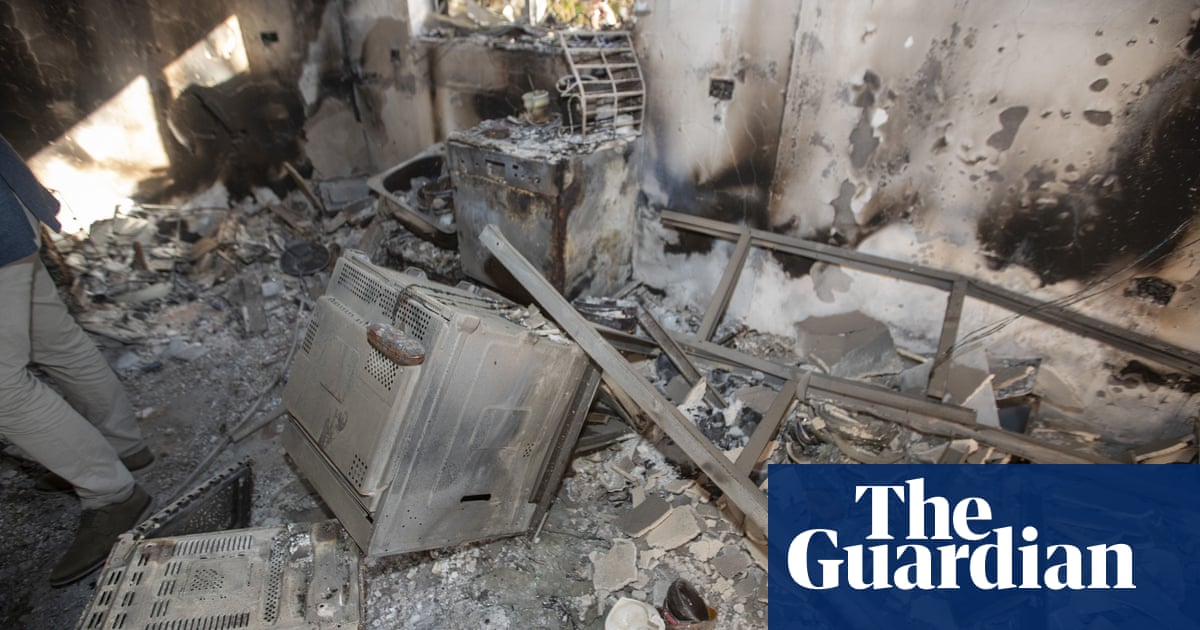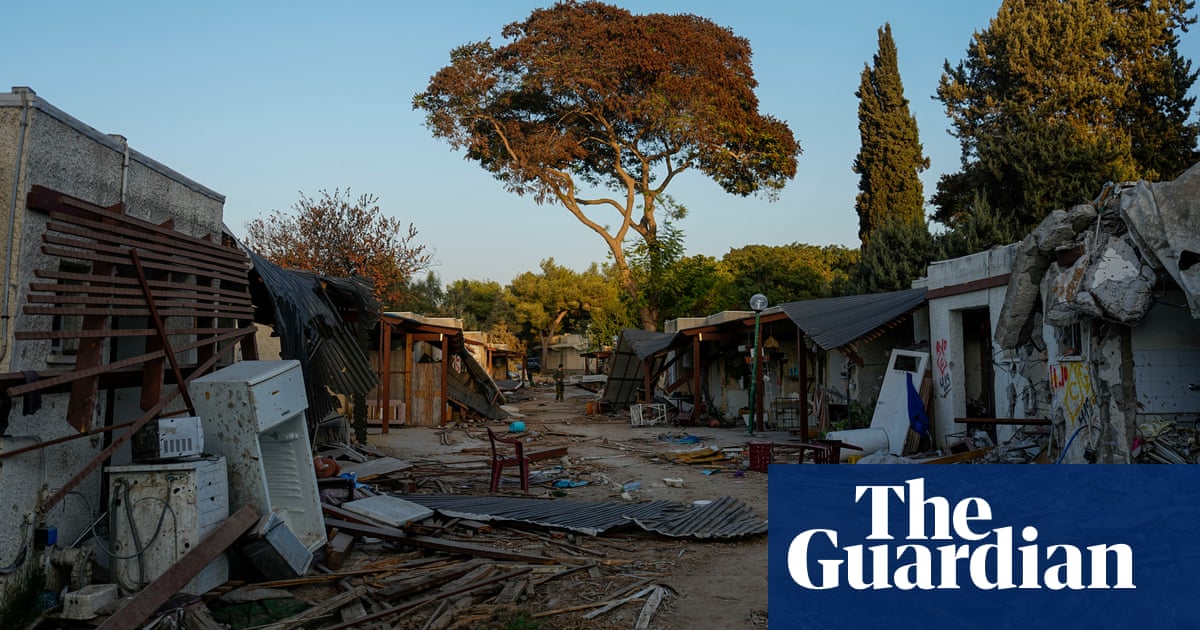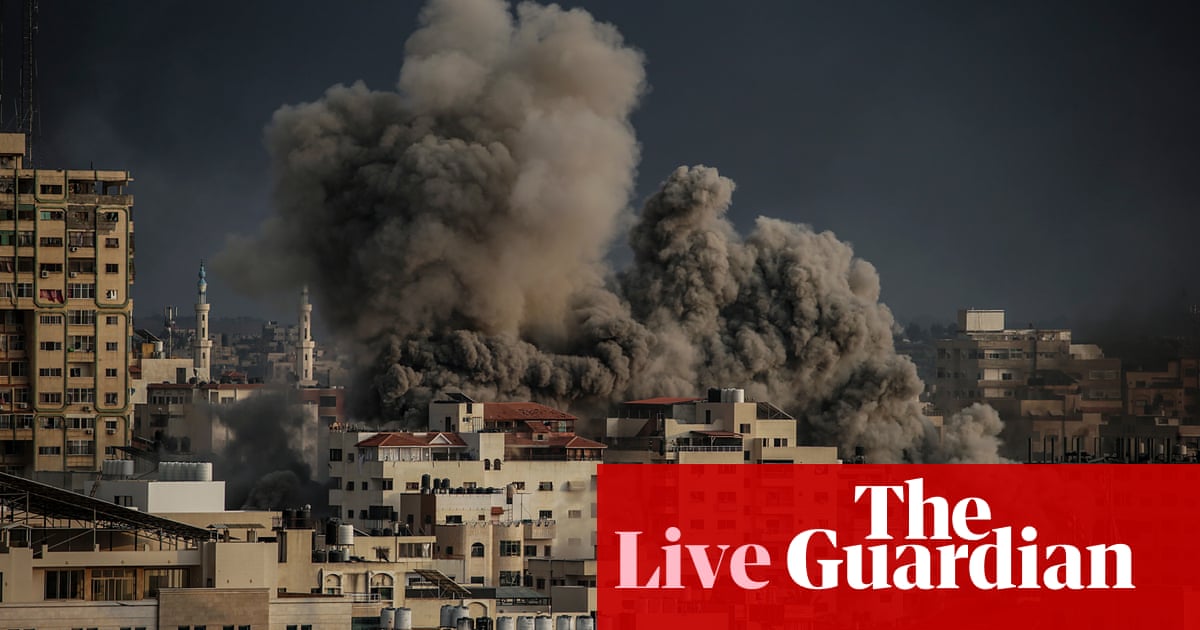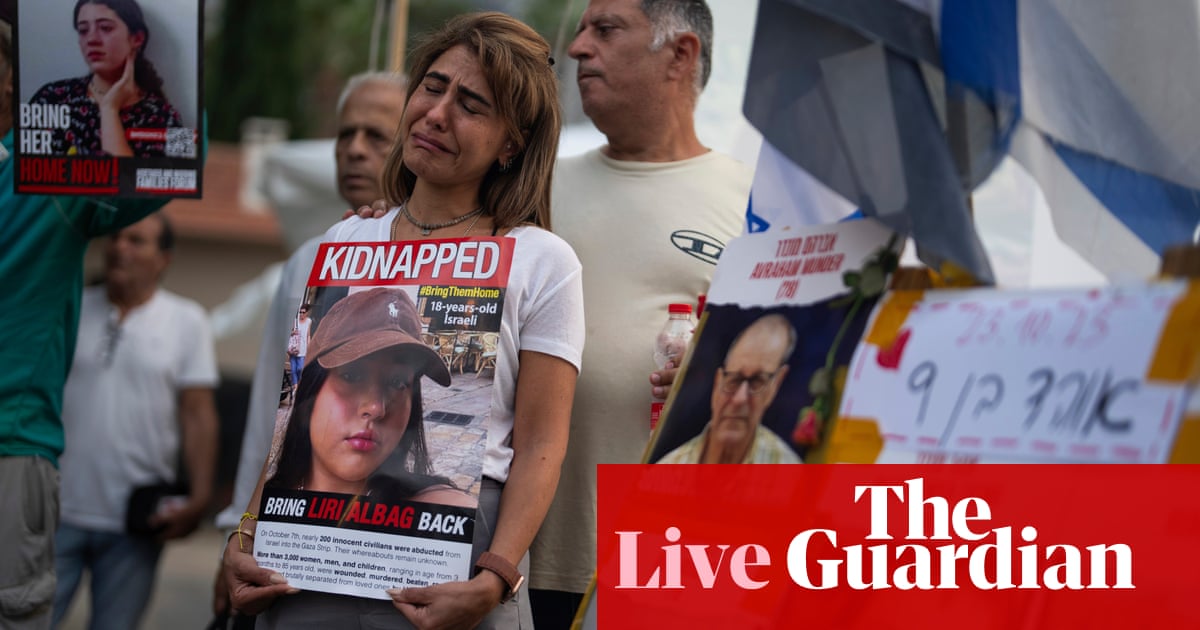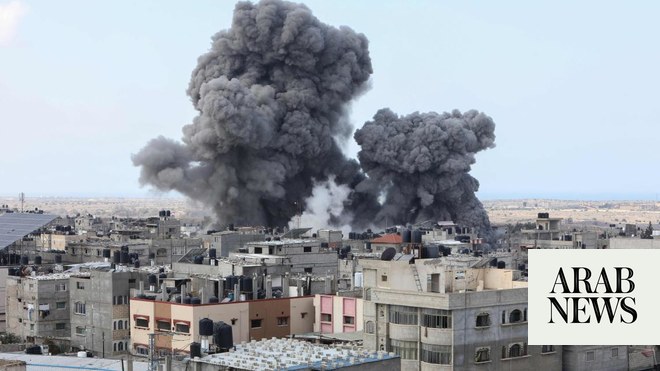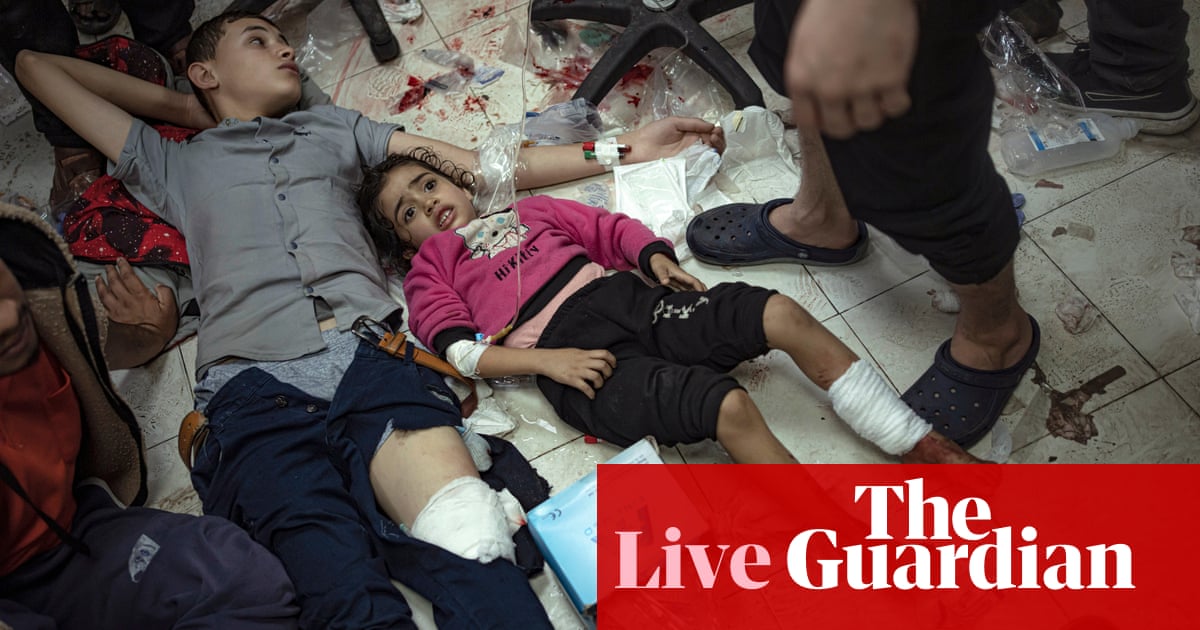
Biden urges global condemnation of sexual violence by Hamas during 7 October attacks
Joe Biden has spoken about “horrific” reports of sexual violence by Hamas during its 7 October attacks on Israel as he blamed the militant group’s refusal to release female hostages for the end of the recent ceasefire.
Speaking at a political fundraiser in Boston on Tuesday, the US president said survivors and witnesses of the attacks and shared accounts of “unimaginable cruelty” over the past few weeks.
“The world can’t just look away at what’s going on,” he said, adding:
Reports of women raped – repeatedly raped – and their bodies being mutilated while still alive, of women’s corpses being desecrated, Hamas terrorists inflicting as much pain and suffering on women and girls as possible and then murdering them.
He said it was “on all of us – government, international organizations, civil society and businesses – to forcefully condemn the sexual violence of Hamas terrorists without equivocation”.
Biden also called on Hamas to release the female hostages it is still holding in Gaza, saying the group’s refusal to free them had led to the breakdown of a truce with Israel.
He said Hamas had “refused to let go” a number of women aged between 20 and 39 under the deal, adding:
These women and everyone still being held hostage by Hamas need to be returned to their families immediately. We’re not going to stop until we bring every one of them home and it’s going to be a long process.
Summary of the day so far
It’s 1am in Gaza City and Tel Aviv. Here’s a recap of the latest developments:
The UN’s top aid official has said the Israeli military campaign in southern Gaza has been just as devastating as in the north, creating “apocalyptic” conditions and ending any possibility of meaningful humanitarian operations. “What we’re saying today is: that’s enough now. It has to stop,” Martin Griffiths said in an interview with the Guardian, adding that the small amount of aid being allowed into Gaza could no longer be distributed.
Israeli forces have reported the most intense day of fighting in Gaza since the ground attack began nearly six weeks ago. The Israel Defense Forces (IDF) said on Tuesday they had mounted an attack into the “heart” of Jabaliya refugee camp in northern Gaza, and that paratroopers and navy commandos had raided the Hamas general security headquarters there. Heavy fighting was also reported in Shujai’iya, another Hamas stronghold in the north.
Israel’s bombing of Gaza’s second city, Khan Younis, in the south of the coastal strip, intensified before an expected ground incursion. Israel’s top military commander, Lt Gen Herzi Halevi, has said his forces are encircling the city of Khan Younis in southern Gaza as he announced the “third phase” of Israel’s ground offensive against Hamas in the Gaza Strip.
Israeli forces have killed at least 16,248 people, including 7,112 children and 4,885 women, in Gaza since 7 October, a statement from the Hamas media office has said. At least 43,616 people have been injured and at least 7,600 people are missing, according to the statement on Tuesday. Health officials in Gaza have said at least 45 people have been killed in an Israeli airstrike on houses in Deir al-Balah in central Gaza on Tuesday.
A “catastrophic hunger crisis” is intensifying in Gaza, the World Food Programme (WFP) warned on Tuesday. “Only a lasting peace can end the suffering and avert the looming humanitarian catastrophe in Gaza,” it said in a statement calling for a humanitarian ceasefire.
The United Nations has heard accounts of sexual violence during the 7 October attacks by Hamas, in a meeting where speakers also attacked women’s rights activists and UN officials for not doing more to investigate or condemn these crimes.
Recently released hostages and relatives of Israelis still held by Hamas in Gaza have confronted Benjamin Netanyahu at an angry meeting in which some of those present reportedly called on the Israeli prime minister to resign. By the latest count, 138 Israelis and other nationals are still being held by Hamas in Gaza. During a week-long ceasefire that expired on Friday, 105 civilians were freed from Hamas captivity in Gaza – including 81 Israelis, 23 Thai nationals and one Filipino – in return for the release of 240 Palestinian women and minors held in Israeli jails.
The US state department has announced it will impose visa bans on Israeli extremist settlers engaged in violence against Palestinian civilians in the occupied West Bank. The restrictions will target those who have committed acts of violence or taken other actions that restrict civilians’ access to essential services and basic necessities and may also apply to those individuals’ family members, US secretary of state Antony Blinken said. The move comes just a month after Israel was granted entry into the US’s visa waiver programme. Israel’s defence minister, Yoav Gallant, said only Israeli military and security forces and the police have the right to use violence.
The US aid chief has announced new support for the Palestinian people during a visit to Egypt’s Sinai peninsula on Tuesday. Samantha Power, the administrator of the US Agency for International Development (USAID), announced $21m (£16.7m) in new US assistance that will include hygiene and shelter supplies and food for people in Gaza, as she travelled to the Egyptian town of El-Arish, the gateway to the Rafah crossing into Gaza.
A Lebanese soldier has been killed in the south of the country by Israeli shelling, according to a statement from the country’s army. Three other were wounded in the incident.
Qatar’s prime minister has said mediation talks were still ongoing with an objective to end the war. “Qatar continues to make efforts to restore the truce, release hostages, and exchange prisoners,” Sheikh Mohammed Bin Abdulrahman al-Thani said on Tuesday.
Rishi Sunak expressed his “disappointment” about the breakdown of the pause in fighting in Gaza during a call with Benjamin Netanyahu on Tuesday, Downing Street said. The two leaders also discussed “urgent efforts to ensure all remaining hostages are safely freed and to allow any remaining British nationals in Gaza to leave”, a No 10 spokesperson said.
Israel is considering flooding tunnels used by Hamas under the Gaza Strip in a bid to destroy the group’s underground network, Israel’s army chief has confirmed.
A Wall Street Journal report on Monday said Israel’s army has assembled a large system of pumps that could flood the approximately 300 miles of Hamas tunnels in Gaza.
The report said that Israel’s army had completed the set-up of at least five pumps about a mile north of the al-Shati refugee camp that could flood the tunnels within weeks.
Asked about the report on Tuesday, Israel’s top military commander, Lt Gen Herzi Halevi, said flooding the tunnels could be a “good idea” and that it was “one of a number of options we are considering”.
Recently released hostages and relatives of Israelis still held by Hamas in Gaza have confronted Benjamin Netanyahu at an angry meeting in which some of those present reportedly called on the Israeli prime minister to resign.
The meeting on Tuesday was addressed by relatives of those still in captivity and by recently returned hostages, some of whom reportedly described mental and physical abuse at the hands of their captors.
Reuven Yablonka, whose son Hanan Yablonka is still being held by Hamas, told the Hebrew daily Maariv that “there was chaos and yelling” at the meeting in which some representatives of the hostage families reportedly walked out as Netanyahu read from pre-prepared remarks. Yablonka said:
They shouted that they want all the hostages to come home. The female captives talked about unpleasant things that happened to them.
What was described as leaked audio from Tuesday’s meeting appeared to record Netanyahu saying that it had not been possible to free all the hostages in a single deal. By the latest count, 138 Israelis and other nationals are still being held by Hamas in Gaza.
“I’m telling you the facts, I respect you too much. We couldn’t bring them all at once. If we could have done it, we would have,” Netanyahu reportedly said.
If there was a chance to bring them all in one fell swoop, do you think anyone here would object?
Excerpts from audio – which the Guardian has not been able to verify – were broadcast by Kan, the Israeli public broadcaster.
Biden urges global condemnation of sexual violence by Hamas during 7 October attacks
Joe Biden has spoken about “horrific” reports of sexual violence by Hamas during its 7 October attacks on Israel as he blamed the militant group’s refusal to release female hostages for the end of the recent ceasefire.
Speaking at a political fundraiser in Boston on Tuesday, the US president said survivors and witnesses of the attacks and shared accounts of “unimaginable cruelty” over the past few weeks.
“The world can’t just look away at what’s going on,” he said, adding:
Reports of women raped – repeatedly raped – and their bodies being mutilated while still alive, of women’s corpses being desecrated, Hamas terrorists inflicting as much pain and suffering on women and girls as possible and then murdering them.
He said it was “on all of us – government, international organizations, civil society and businesses – to forcefully condemn the sexual violence of Hamas terrorists without equivocation”.
Biden also called on Hamas to release the female hostages it is still holding in Gaza, saying the group’s refusal to free them had led to the breakdown of a truce with Israel.
He said Hamas had “refused to let go” a number of women aged between 20 and 39 under the deal, adding:
These women and everyone still being held hostage by Hamas need to be returned to their families immediately. We’re not going to stop until we bring every one of them home and it’s going to be a long process.
Limited humanitarian aid is being delivered to the Rafah region in southern Gaza because of intense hostilities, a United Nations spokesperson has said.
Only 100 aid trucks with humanitarian supplies and 69,000 litres of fuel entered Gaza from Egypt on Monday, Stéphane Dujarric said. About the same amount was delivered on Sunday, he said.
In comparison, about 170 trucks and 110,000 litres of fuel entered Gaza on a daily basis during the humanitarian pause from 24 November to 30 November, he said.
Citing Lynn Hastings, the UN’s humanitarian coordinator in the Palestinian territories, Dujarric said: “Shelters have no capacity, the health system is on its knees, and there is a lack of clean drinking water, no proper sanitation and poor nutrition.”
There are no safe places in Gaza and “those places that fly the UN flag are not safe either,” he added.
He also said that the main telecommunication provider in Gaza had announced the shutdown of all telecom services Monday night.
A Hamas official has said there will be no negotiations or exchange of detainees until the Israeli assault against the Gaza Strip stops.
Speaking to reporters in Beirut on Tuesday, Hamdan also said that Israel’s prime minister, Benjamin Netanyahu, was “responsible” for the lives of Israeli hostages in Gaza, adding that his true objective is to “eliminate the Palestinian people”. He said:
We hold Netanyahu fully responsible for the lives of the Israeli hostages and for obstructing the completion of the exchange deal.
Two first responders from Israel addressed the UN meeting in person.
Simcha Greinman, who collected victims’ remains from the sites of attacks, described finding a woman’s body, naked from the waist down, leaning over a bed. The corpse had been booby trapped with a live grenade, hidden in the woman’s hand, he added.
Among the bodies he recovered were two people who had suffered genital mutilation, one a woman who had “nails and different objects” in her genitals, the other so badly damaged “we couldn’t even identify if its a man or a woman”.
Shari Mendes, an architect who prepares bodies for burial, said her team leader “saw several female soldiers who were shot in the crotch, intimate parts, vagina, or shot in the breast. This seemed to be systematic genital mutilation of a group of victims.”
Senator Kirsten Gillibrand described video of a fresh bloodstain on the crotch of a teenage hostage, visible when she was dragged out of a Jeep in Gaza soon after her abduction, as evidence of sexual assault, and joined other speakers calling for activists to condemn Hamas. She told the meeting:
When I saw the list of women’s rights organisations who have said nothing, I nearly choked. Where is the solidarity?
A UN commission of inquiry investigating war crimes on both sides of the Israel-Hamas conflict has said it would focus on sexual violence by Hamas in the 7 October attacks on Israel and was about to launch an appeal for evidence, Reuters reported last week.
However its work is likely to be hampered by the fact that Israel has not cooperated with the commission, which it accuses of having an anti-Israel bias.
The United Nations has heard accounts of sexual violence during the 7 October attacks by Hamas, in a meeting where speakers also attacked women’s rights activists and UN officials for not doing more to investigate or condemn these crimes.
Israeli officials and frontline workers, senior US politicians and activists from both countries spoke at the meeting on Monday, organised in part by former Meta executive Sheryl Sandberg. She told those gathered that “silence is complicity”.
Hamas denies that its fighters carried out sexual violence; Sandberg asked if the world should believe them, or “the women whose bodies tell us how they spent the last minutes of their lives” and called for a “full and fair investigation” from the UN.
Former US secretary of state Hillary Clinton, in a recorded message, said:
It is outrageous that some who claim to stand for justice are closing their minds and their hearts to the victims of Hamas.
The meeting, attended by about 800 people including diplomats from dozens of countries, watched videos from police interviews with first responders who described genital mutilation and shooting at breasts. A survivor of the attack on the Supernova rave described witnessing a gang-rape.
‘Apocalyptic’ conditions in southern Gaza blocking aid, top UN official says
The UN’s top aid official has said the Israeli military campaign in southern Gaza has been just as devastating as in the north, creating “apocalyptic” conditions and ending any possibility of meaningful humanitarian operations.
Martin Griffiths, the UN emergency relief coordinator, said he was speaking on behalf of the entire international aid community in saying the continuing offensive had robbed aid workers of any significant means of helping the 2.3 million people of Gaza, other than to call for an immediate end to the fighting.
“What we’re saying today is: that’s enough now. It has to stop,” Griffiths said in an interview with the Guardian, adding that the small amount of aid being allowed into Gaza could no longer be distributed, since the Israeli ground offensive had spread to southern Gaza and the city of Khan Younis, bringing the humanitarian operation effectively to an end.
“It isn’t really a statistically significant operation any more,” said Griffiths, who is also UN undersecretary general for humanitarian affairs.
It’s a bit of a patch on a wound and it doesn’t do the job, and it would be an illusion for the world to think that the people in Gaza can be helped by the humanitarian operation under these conditions.
This is an apocalyptic situation now, because these are the remnants of a nation being driven into a pocket in the south.
World Food Programme says "catastrophic hunger crisis" is intensifying
A “catastrophic hunger crisis” is intensifying in Gaza, the Nobel Peace prize-winning World Food Programme (WFP) warned on Tuesday as Israeli military operations escalate.
In a statement, the Rome-based United Nations group called for a resumption of the ceasefire between Israel and Hamas that broke down last week.
The pause in fighting had allowed aid to reach places previously out of reach:
The resumption of hostilities in Gaza will only intensify the catastrophic hunger crisis that already threatens to overwhelm the civilian population.
The seven-day pause in fighting allowed WFP and our partners some safety to scale up relief operations. In that time, we were able to double the number of distribution points outside shelters and deliver food in places that had been impossible to reach, including in some northern areas. WFP reached approximately 250,000 people in just one week.
Tragically, this desperately needed progress is now being lost. The renewed fighting makes the distribution of aid almost impossible and endangers the lives of humanitarian workers. Above all, it is a disaster for the civilian population of Gaza, more than 2m people, whose only lifeline is food assistance.
Humanitarians must have safe, unimpeded, and sustained access, so we are able to distribute life-saving assistance throughout the territory. All parties must uphold their obligations under international humanitarian law.
But only a lasting peace can end the suffering and avert the looming humanitarian catastrophe in Gaza. WFP calls for a humanitarian ceasefire and urges all leaders to work with the utmost urgency to find political solutions that can end the suffering of families on all sides of this harrowing conflict.
The US is repeating calls for Israel to allow more fuel and humanitarian aid into Gaza as conditions in the south of the war-torn territory continue to worsen, Reuters reports.
His comments on Tuesday marked the second day in a row that US state department spokesperson Matthew Miller told a press briefing that the the government was concerned at Israel’s handling of the situation:
There is not enough being done right now. The level of assistance that’s getting in is not sufficient. It needs to go up, and we’ve made that clear to the government of Israel.
Miller said on Monday that Israel originally refused to let any fuel in on Friday as the week-long truce with Hamas expired. Aid had resumed, he said, but only a trickle of trucks was being allowed into Gaza.
US secretary of state Antony Blinken, on his third trip to the Middle East since the Hamas attack on 7 October, pressed the Israeli government last week to increase the flow of aid to Gaza and to minimize civilian harm.
USAID chief Power: Palestinian civilians "must be protected"
Samantha Power, administrator of the US Agency for International Development (USAID), has been speaking about the civilian death toll in Gaza.
Power, an expert on the international response to genocide and mass atrocities before she joined government, has consistently been the most outspoken of Biden administration officials in describing the impact on civilians of Israel’s military campaign.
Talking to reporters in el-Arish, near Egypt’s border with Gaza, Power said:
First, as Israel’s military operations continue, Palestinian civilians must be protected. Far too many innocent civilians have been killed. Some parents in Gaza are writing names on their children’s legs so that they can be identified if they or their families are killed.
Other parents are having their children split up, sheltering at different locations, putting them with different relatives, so as to increase the chances that at least some of them will survive.
No parent should ever have to make choices like that. Military operations need to be conducted in a way that distinguishes fighters from civilians.
Power is in Egypt overseeing the delivery of 36,000lb (16,330kg) of US humanitarian relief supplies.
The airlift was “delivered via a US Air Force C-17 to Egypt to subsequently be transported via ground into Gaza and then distributed by UN agencies”, Brig Gen Pat Ryder told a Pentagon press briefing on Tuesday.
Only Israeli military and security forces and the police have the right to use violence, the country’s defense minister Yoav Gallant said Tuesday, speaking against attacks by Jewish settlers on Palestinians in the West Bank.
Gallant was speaking at a press conference hours after the US announced it would impose visa bans against individuals involved in undermining peace, security or stability in the occupied territory, Reuters reported.
Gallant said:
There is, sadly, violence from extremists that we must condemn. In a state of law, and Israel is a state of law, the right to use violence belongs only to those who are certified to do so by the government, in our case that’s the IDF (military), the Israeli police, the Shin Bet (security service) and such.
The US House of Representatives passed a Republican-led resolution on Tuesday condemning antisemitism globally, CNN reported.
But the measure was not unanimous. Senior Democratic congressmen Jerry Nadler and Daniel Goldman of New York, and Jamie Raskin of Maryland, urged colleagues to vote “present” on the Republican resolution, arguing a bipartisan approach was needed.
The language within, they said, was too broad and “would effectively define any criticism of the Israeli government or its policies as antisemitism”, the network said.
Political rancor has hampered a unified approach to the Israel conflict in Congress. Joe Biden has urged lawmakers to come together to pass his $106bn (£840m) supplemental budget request, including assistance for Israel and humanitarian aid for Palestinians in Gaza, but many Republicans oppose the amount of money included to help Ukraine defend itself against the Russian invasion.
Rishi Sunak "disappointed" in truce breakdown during call with Netanyahu
Rishi Sunak expressed his “disappointment” about the breakdown of the pause in fighting in Gaza during a call with Benjamin Netanyahu on Tuesday, Downing Street said.
A No 10 spokesperson said the UK prime minister “expressed disappointment about the breakdown of the pause in fighting in Gaza, which had allowed hostages to be released”.
The two leaders also discussed “urgent efforts to ensure all remaining hostages are safely freed and to allow any remaining British nationals in Gaza to leave”, they said. The statement continues:
The prime minister offered an update on his engagement with leaders in the Middle East and reiterated his public remarks in the region last week, stressing the need for Israel to take greater care to protect civilians in Gaza and focus narrowly on military targets.
The prime minister said more humanitarian aid had to be allowed to enter Gaza, where civilians were in desperate need. He reiterated offers of practical UK support to facilitate deliveries of life-saving aid. He noted the pressure on the Rafah crossing point and pressed the need to explore other routes into Gaza, including via Kerem Shalom.




